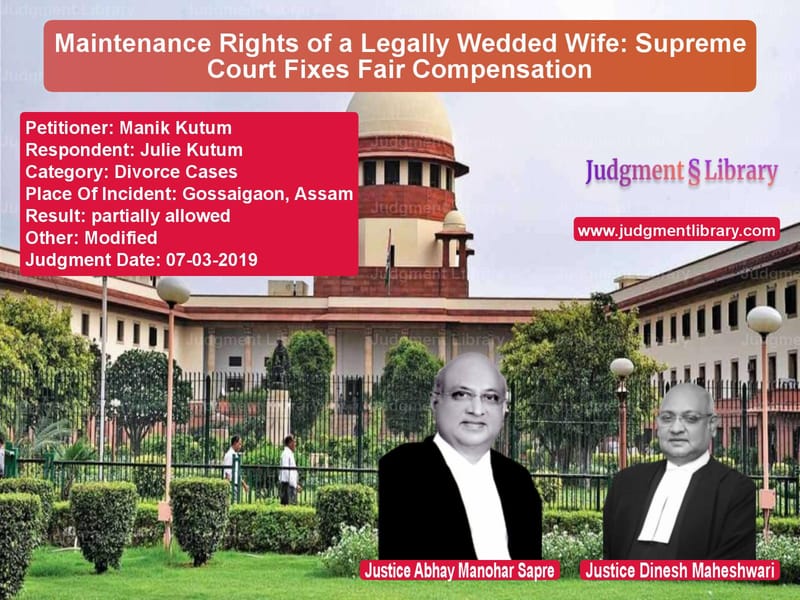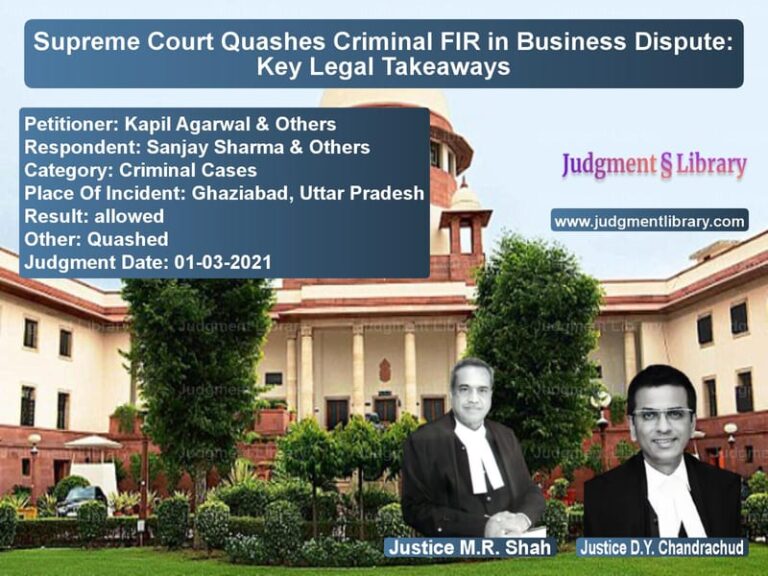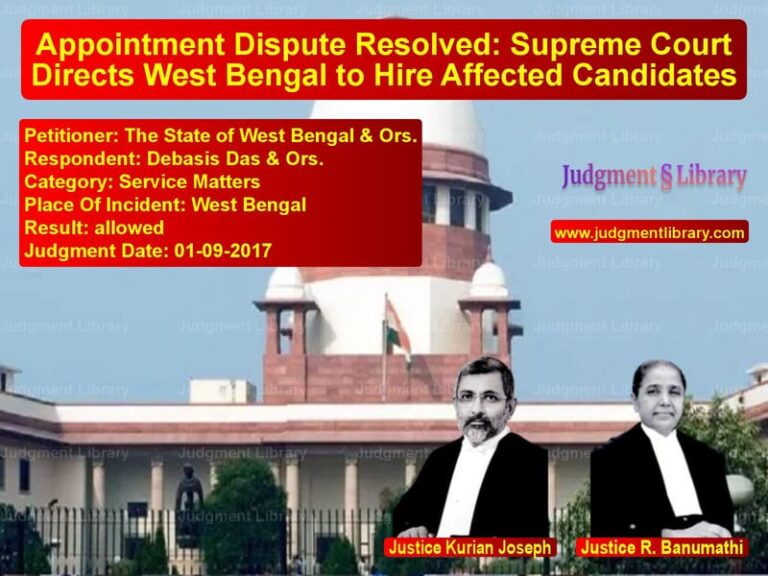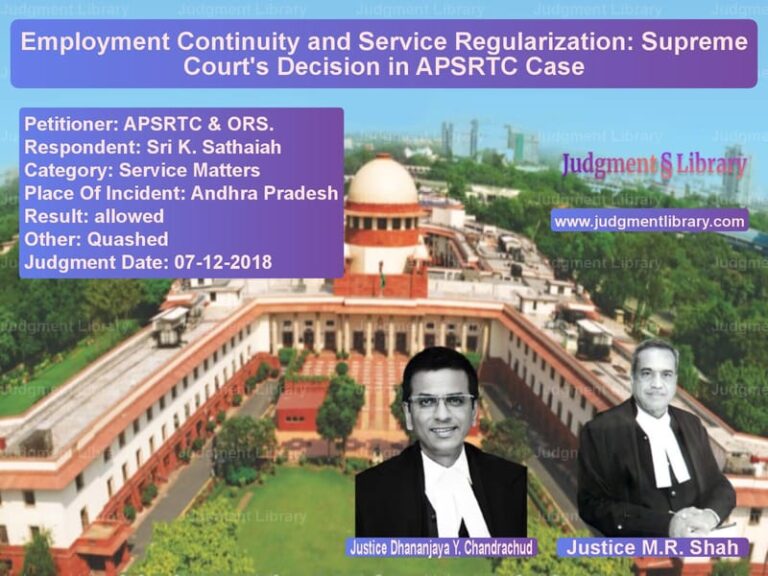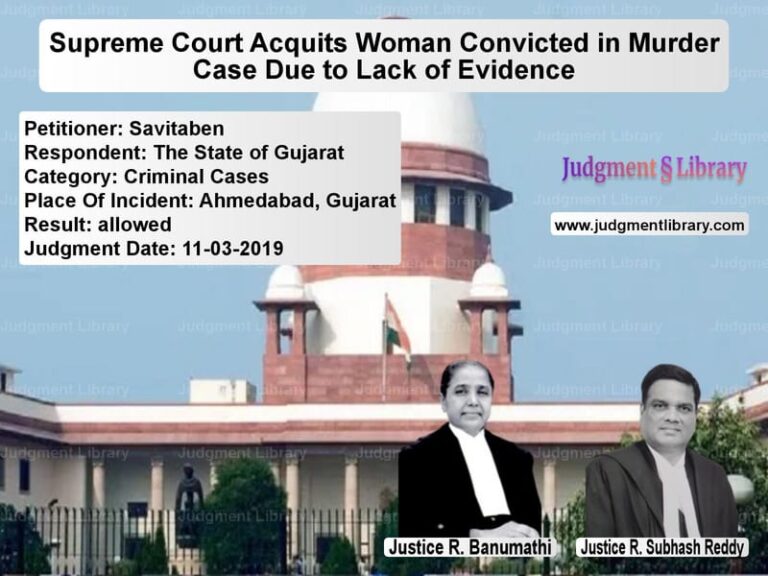Maintenance Rights of a Legally Wedded Wife: Supreme Court Fixes Fair Compensation
The case of Manik Kutum v. Julie Kutum is a significant ruling by the Supreme Court of India concerning the maintenance rights of a legally wedded wife under Section 125 of the Code of Criminal Procedure, 1973. The Supreme Court, in its judgment dated March 7, 2019, provided clarity on the grant of maintenance, rejecting unnecessary remand of cases when factual findings are clear.
The dispute arose when the appellant, Manik Kutum, challenged an order passed by the Gauhati High Court, which directed the Sub-Divisional Judicial Magistrate (SDJM), Gossaigaon, Assam, to reconsider the maintenance application filed by the respondent, Julie Kutum. The Supreme Court, while modifying the High Court’s order, held that when there is a clear finding that a woman is a legally wedded wife, remanding the case for fresh inquiry is unnecessary and would only delay justice.
Case Background
The respondent, Julie Kutum, had filed an application under Section 125 CrPC seeking maintenance for herself and her minor daughter. She claimed that the appellant, her husband, had refused to provide financial support despite having the means to do so.
The SDJM, in its order dated November 21, 2011, granted a monthly maintenance of Rs. 2,000 for the minor daughter but rejected the wife’s claim on the ground that she was not legally married to the appellant.
Feeling aggrieved, the respondent approached the Gauhati High Court in revision. The High Court, in its order dated August 1, 2017, set aside the SDJM’s decision and remanded the case for reconsideration, directing the trial court to declare the respondent as the legally wedded wife and reassess the quantum of maintenance based on the appellant’s income.
This order was challenged by the appellant before the Supreme Court.
Petitioner’s Arguments
The appellant, represented by Advocate Seema Sharma, contended that:
- The High Court erred in remanding the case when the trial court had already decided that the respondent was not his legally wedded wife.
- The trial court’s decision was based on evidence, and the High Court should not have interfered with it.
- There was no need to reconsider the quantum of maintenance, as the SDJM had already made a fair determination.
Respondent’s Arguments
The respondent, represented by Advocate Sahil Tagotra, countered with the following arguments:
- The High Court had rightly concluded that the respondent was the legally wedded wife and that she was entitled to maintenance.
- Given the appellant’s financial condition, he should be directed to pay an adequate amount for the maintenance of both the wife and child.
- The SDJM’s finding that she was not the legally wedded wife was erroneous and needed correction.
Supreme Court’s Observations and Ruling
The Supreme Court scrutinized the findings of the High Court and the SDJM and concluded that the High Court had already determined that the respondent was the legally wedded wife of the appellant. The Court noted:
“The High Court having recorded a finding of fact in Para 22 of the impugned order that the respondent-wife is the legally wedded wife of the appellant, it should not have then remanded the case to the SDJM for any inquiry and instead should have fixed the maintenance payable by the appellant-husband to the respondent-wife in the revision itself.”
The Court further observed that the respondent had no independent income to support herself. It ruled that remanding the case would unnecessarily prolong the litigation and cause hardship to the wife.
In assessing the financial capacity of the appellant, the Supreme Court noted that he was working as a constable in the Railway Protection Force (RPF) and earned a monthly salary of Rs. 30,000–35,000. Based on this, the Court determined that an appropriate amount should be fixed for maintenance.
The Court modified the High Court’s order and fixed a monthly maintenance of Rs. 8,000 for the respondent (wife) in addition to the Rs. 2,000 already awarded for the minor daughter by the SDJM.
The Court directed:
“The appellant (husband) will pay a total sum of Rs. 10,000 (Ten Thousand) every month to the respondent (wife), i.e., Rs. 8,000 towards maintenance for the respondent (wife) and Rs. 2,000 towards maintenance for the minor daughter, which is already fixed by the SDJM and which we uphold as being just and proper.”
It further ordered:
“The appellant will pay the amount of Rs. 10,000 to the respondent (wife) on the 1st of every month from 01.03.2019 regularly.”
Conclusion
The Supreme Court’s judgment reinforced the rights of wives to receive fair maintenance and clarified that once a factual finding regarding marital status is recorded, courts should not remand cases unnecessarily.
The key takeaways from this case include:
- A legally wedded wife is entitled to maintenance under Section 125 CrPC.
- Remanding cases where factual findings are already established is unnecessary and delays justice.
- The quantum of maintenance should be fixed considering the husband’s financial capacity.
- The burden of proof lies on the husband to establish that he is unable to provide for his wife and child.
This judgment serves as a guiding principle for courts handling maintenance cases, ensuring that women are not left without financial support due to procedural delays.
Petitioner Name: Manik Kutum.Respondent Name: Julie Kutum.Judgment By: Justice Abhay Manohar Sapre, Justice Dinesh Maheshwari.Place Of Incident: Gossaigaon, Assam.Judgment Date: 07-03-2019.
Don’t miss out on the full details! Download the complete judgment in PDF format below and gain valuable insights instantly!
Download Judgment: Manik Kutum vs Julie Kutum Supreme Court of India Judgment Dated 07-03-2019.pdf
Direct Downlaod Judgment: Direct downlaod this Judgment
See all petitions in Alimony and Maintenance
See all petitions in Child Custody
See all petitions in Muslim Personal Law
See all petitions in Divorce by Desertion
See all petitions in Judgment by Abhay Manohar Sapre
See all petitions in Judgment by Dinesh Maheshwari
See all petitions in partially allowed
See all petitions in Modified
See all petitions in supreme court of India judgments March 2019
See all petitions in 2019 judgments
See all posts in Divorce Cases Category
See all allowed petitions in Divorce Cases Category
See all Dismissed petitions in Divorce Cases Category
See all partially allowed petitions in Divorce Cases Category

